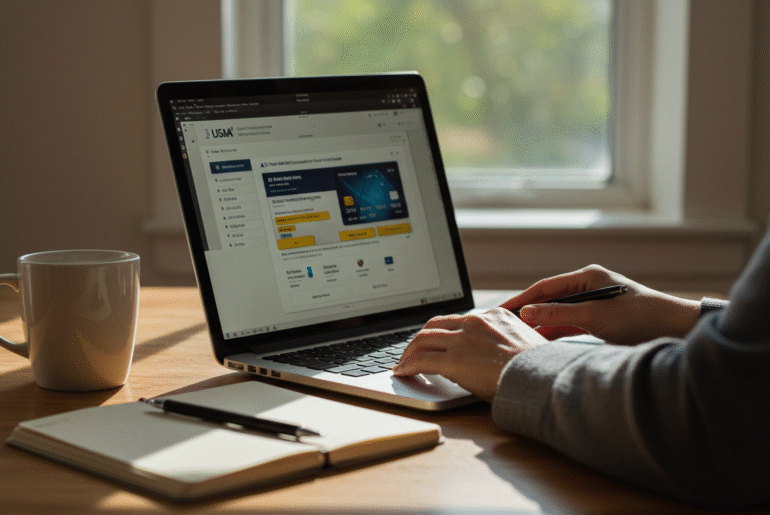This article may contain references to products or services from one or more of our advertisers or partners. We may receive compensation when you click on links to those products or services. Nonetheless, our opinions are our own.
The information presented in this article is accurate to the best of our knowledge at the time of publication. However, information is subject to change, and no guarantees are made about the continued accuracy or completeness of this content after its publication date.
Simple Ways To Improve Your Financial Health
Managing money doesn’t have to be complicated. By making intentional changes, you can strengthen your financial health and build long-term stability. Whether starting out or getting back on track, these steps can help improve your financial journey.
Track Your Spending
The first step to stronger financial health is knowing where your money goes. Use a budgeting app, spreadsheet, or notebook to record expenses. This clarity helps you identify unnecessary spending and make adjustments.
Build a Budget That Works for You
A budget ensures your money is used wisely. Try the 50/30/20 rule: 50% for needs, 30% for wants, and 20% for savings or debt repayment. Choose a method you can maintain consistently.
Start an Emergency Fund
Unexpected costs are unavoidable. Aim for three to six months of expenses, but start small if needed. Even saving $10 weekly builds momentum and confidence.
Pay Down Debt Strategically
High-interest debt can slow progress. Consider the avalanche method (tackle highest interest first) to save more on interest, or the snowball method (tackle smallest balances first) for quick wins. Use whichever method keeps you motivated.
Save for the Future
Time is your strongest ally in building wealth. Contribute to employer retirement plans like a 401(k) or open an IRA. Even small contributions grow significantly through compounding.
Cut Unnecessary Expenses
Review your subscriptions and habits regularly. Cancel unused services, cook more at home, and choose affordable alternatives. Redirect savings to financial goals for better results.
Increase Your Income
Boosting income helps you reach financial goals faster. Explore freelancing, side jobs, or skill upgrades that can lead to higher-paying opportunities.
Protect Yourself with Insurance
Insurance safeguards your finances. Health, life, auto, and renter’s or homeowner’s insurance can prevent major out-of-pocket costs and protect your savings from unexpected events.
Monitor Your Credit
Healthy credit supports financial opportunities. Pay bills on time, keep credit utilization low, avoid unnecessary new accounts, and review reports regularly to correct errors.
Keep Learning About Money
Improving financial literacy leads to better choices. Read books, listen to podcasts, and take courses to strengthen your knowledge and decision-making over time.
Voted "Best Overall Budgeting App" by Forbes and WSJ
Monarch Money helps you budget, track spending, set goals, and plan your financial future—all in one app.
Get 50% OFF your first year with code MONARCHVIP
Final Thoughts
Improving financial health is about consistency, not perfection. By tracking spending, budgeting, saving, and learning continuously, you can create lasting financial stability and security over time.
Frequently Asked Questions
What is the first step to improving financial health?
Tracking your spending is the first step. Once you see where your money goes, it becomes easier to create a budget and adjust spending habits.
How much should I keep in an emergency fund?
Save three to six months of essential expenses. If that feels overwhelming, start small, such as setting aside $500, and build gradually.
What’s the best way to pay off debt?
The avalanche method saves money by paying highest interest debt first, while the snowball method builds motivation by paying off smaller debts quickly. Select the one that works best for you.
How can I improve my credit score quickly?
Pay bills on time, lower credit card balances, avoid multiple new accounts in a short span, and dispute any errors on your credit report.
What if I don’t earn enough to save?
Start with small amounts, such as $5 or $10 per week, to build the habit. Trim recurring costs and consider extra income streams to create savings capacity.
Is it ever too late to start saving for retirement?
No. While earlier contributions provide more growth, later saving still strengthens financial security. Increase contributions when income rises or debts decrease.

Reviewed and edited by Albert Fang.
See a typo or want to suggest an edit/revision to the content? Use the contact us form to provide feedback.
At FangWallet, we value editorial integrity and open collaboration in curating quality content for readers to enjoy. Much appreciated for the assist.
Did you like our article and find it insightful? We encourage sharing the article link with family and friends to benefit as well - better yet, sharing on social media. Thank you for the support! 🍉
Article Title: Simple Ways to Improve Your Financial Health
https://fangwallet.com/2025/08/25/simple-ways-to-improve-your-financial-health/The FangWallet Promise
FangWallet is an editorially independent resource - founded on breaking down challenging financial concepts for anyone to understand since 2014. While we adhere to editorial integrity, note that this post may contain references to products from our partners.
The FangWallet promise is always to have your best interest in mind and be transparent and honest about the financial picture.
Become an Insider

Subscribe to get a free daily budget planner printable to help get your money on track!
Make passive money the right way. No spam.
Editorial Disclaimer: The editorial content on this page is not provided by any of the companies mentioned. The opinions expressed here are the author's alone.
The content of this website is for informational purposes only and does not represent investment advice, or an offer or solicitation to buy or sell any security, investment, or product. Investors are encouraged to do their own due diligence, and, if necessary, consult professional advising before making any investment decisions. Investing involves a high degree of risk, and financial losses may occur including the potential loss of principal.
Source Citation References:
+ Inspo
There are no additional citations or references to note for this article at this time.












































